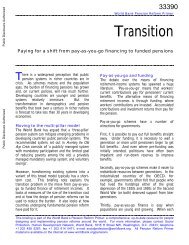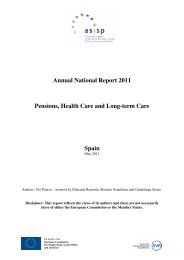Financial Sector Development in Africa: Opportunities ... - World Bank
Financial Sector Development in Africa: Opportunities ... - World Bank
Financial Sector Development in Africa: Opportunities ... - World Bank
Create successful ePaper yourself
Turn your PDF publications into a flip-book with our unique Google optimized e-Paper software.
F<strong>in</strong>anc<strong>in</strong>g Agriculture: Selected Approaches for the Engagement of Commercial F<strong>in</strong>ance 101<br />
rema<strong>in</strong>s, however, of how best to fund long-term growth to help these<br />
bus<strong>in</strong>esses reach the scale and professionalism of management required<br />
to serve domestic needs, as well as potentially compete <strong>in</strong> <strong>in</strong>ternational<br />
markets.<br />
Undercapitalization of Agribus<strong>in</strong>ess<br />
A recurr<strong>in</strong>g worry of bankers <strong>in</strong> response to proposals to <strong>in</strong>crease credit<br />
allocation to agriculture seems to be a perception of the “undercapitalization”<br />
of agribus<strong>in</strong>ess. By this they mean bus<strong>in</strong>esses that are constantly<br />
hav<strong>in</strong>g short-term cash flow issues as a result of hav<strong>in</strong>g <strong>in</strong>sufficient <strong>in</strong>vestment<br />
or access to longer-term capital.<br />
These issues can be the result of a number of causes. Perhaps the bus<strong>in</strong>ess<br />
is grow<strong>in</strong>g too fast <strong>in</strong> relation to its longer-term capital (typically<br />
called overtrad<strong>in</strong>g), and is struggl<strong>in</strong>g to f<strong>in</strong>ance production while it awaits<br />
payment on previous sales. Perhaps the owners understand this problem<br />
but are unable or unwill<strong>in</strong>g to make further <strong>in</strong>vestment <strong>in</strong> the company<br />
themselves. Typically they will then try to access expensive short-term<br />
credit (if it is available), which will compound the problem. Perhaps the<br />
owners do not understand the implications of expensive credit, or are<br />
stripp<strong>in</strong>g the company of cash for other purposes. After all, a profitable<br />
company should be able to reta<strong>in</strong> earn<strong>in</strong>gs and build up its capital over<br />
time <strong>in</strong> l<strong>in</strong>e with growth.<br />
These are some of the issues that bankers look at very carefully when<br />
assess<strong>in</strong>g a credit proposition. Lack of cash is a bus<strong>in</strong>ess killer, and lend<strong>in</strong>g<br />
to an undercapitalized bus<strong>in</strong>ess is a dubious proposition. That is why,<br />
when bankers get a request from a customer for a major <strong>in</strong>crease <strong>in</strong> longterm<br />
lend<strong>in</strong>g, they like to see a significant contribution of equity <strong>in</strong>vestment<br />
as well. It is difficult to generalize, and it varies from bank to bank<br />
and sector to sector, but for illustrative purposes many commercial bankers<br />
may start to take a close look at an SME if it has more debt than<br />
equity, as a general pr<strong>in</strong>ciple (that is, on the assumption that the debtequity<br />
should be a 1:1 ratio or better).<br />
Clearly, many bus<strong>in</strong>ess owners may take a different attitude. Some<br />
of them perceive that they have already risked a lot and expended<br />
much effort <strong>in</strong> build<strong>in</strong>g what they see as a profitable operation. They<br />
feel that it is now up to the banks to fund long-term growth while<br />
they beg<strong>in</strong> to reap the profits. This gap <strong>in</strong> expectations is a feature of<br />
every market, particularly <strong>in</strong> emerg<strong>in</strong>g markets where bus<strong>in</strong>ess owners<br />
may have less commercial experience and poor access to good f<strong>in</strong>ancial<br />
advice.







